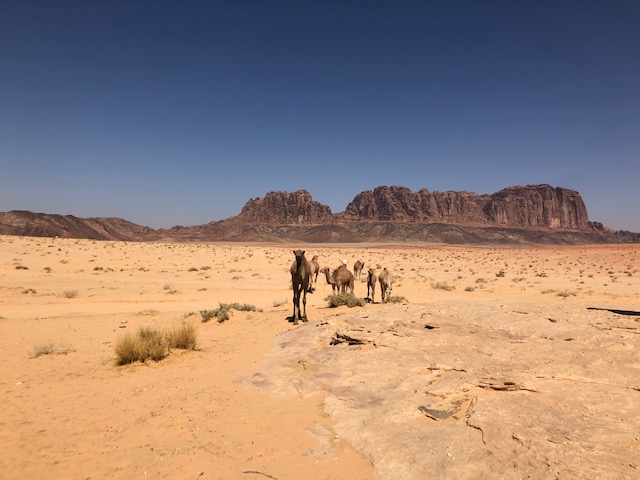Fun facts and interesting tidbits I learned from traveling to Amman, Wadi Rum, the Dead Sea, Petra and Madaba
- The streets of downtown Amman are lively with vendors, music and food. They spill onto the sidewalks and streets during the day and at night.
- In some stores, the price of an item will be written in Arabic numbers. The best way to recognize the numbers is to add up the corners.
- Jordanians have a sweet tooth. There’s a dessert store on almost every corner. Locals will gladly stand in line at the best places.
- There’s a strong emphasis on family, and they tend to be big families at that, with an average of 7 children in some areas.
- The ratio of males to female is 1:7, one of the reasons why polygamous marriage works here.
- Camels roam the deserts in Jordan. Though they can be on their own, they are all owned and not wild. They can live up to 45 years and don’t need food or water for 21 days.
- Wadi Rum, or Valley of the Moon, covers 280 square miles with sandstone mountains and unique red sand. The amount of iron is what makes the colors vary.
- Mosquitoes aren’t the issue in the desert. It’s the flies that will drive you mad.
- The original population of Jordanians are Bedouin, or desert dwellers. Though they used to be nomads, most have settled down and have homes in the desert, or camps that also serve as a temporary home for tourists.
- A Bedouin camp is the best way to experience Wadi Rum because you learn about the local culture, get the traditional zarb meal cooked underground, the fireside music, sweet tea rituals and the genuine hospitality.
- Lawrence of Arabia is not the home town hero you would expect. Most Jordanians consider him a traitor and spy.
- Indiana Jones is revered on the other hand, and you can find hats, whips and t-shirts as souvenirs.
- Petra is the rose gold, hidden city established in 312 BC that includes cave-homes, tombs and temples, all carved by hand.
- Covering most of the Petra is a sweat-inducing all day activity. Though most wouldn’t describe it as a hike, that’s how you should prepare for it.
- Donkeys and horses are mistreated in Petra. Though there have been moves and petitions to ban the animals, UNESCO doesn’t want to take away from the authenticity of traveling to the sites. Expect some strong smells and beware of the horses barreling through the Siq!
- Haggling is expected so don’t purchase anything at the first quoted price. Good news is “there’s no charge for looking” which you’ll hear in playful tones over and over again.
- The Dead Sea is the lowest point on earth with an average temperature of 85 degrees, making it a year-round destination and “spa” excursion.
- Though it is said to heal body aches and pains and clear up skin conditions, any recent cuts or shaved body parts will burn.
- Sunscreen isn’t a necessity here as UV rays are filtered through three natural layers until it reaches the lowest point on earth. You get all the good Vitamin D instead!
- Madaba is the “City of Mosaics” and home to the oldest mosaic map of the holy land made with two million pieces of stone.
- Most people smoke. In fact over 70% of men are smokers, one of the highest rates in the world.
- Napkins aren’t a given at restaurants or when you’re dining. Sometimes they will provide tissue boxes instead.
- Waiters take the drink order after the food order in most restaurants.
- Lemon mint drinks are some of the most popular beverages – they are STRONG and people either love them or hate them!
- Set expectations low for WiFi, whether it’s in public places, hotels or restaurants.
- Tea is almost always offered if you chat with a Jordanian person for more than a few minutes. It’s considered courteous to say yes.
Click here for what to pack and my entire travel adventure in Jordan!



